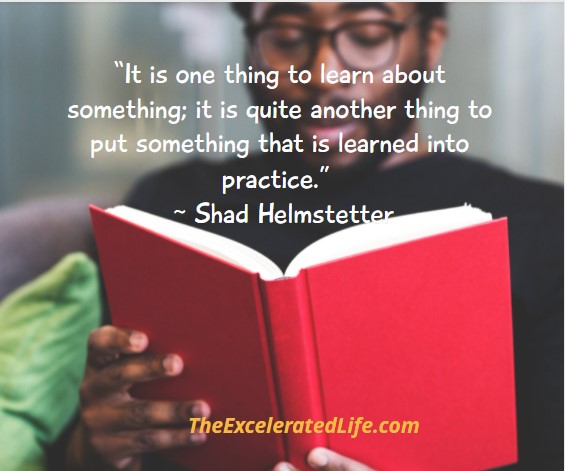Establishing self-discipline is the “one special quality” that guarantees you “greater success, accomplishment, and happiness in life”. Without self-discipline, you are liable to experience health problems, financial problems, distractions, clutter, overwhelm, and more. By practicing self-discipline daily, you make it your superpower!
Title Photo by Klaus Nielsen
Self-discipline – Your Superpower?
What if you had a superpower? And what if your superpower was the ability to always do what you say you are going to do?
First, let’s look at what imagining you have a superpower can do. In a study at the University of Minnesota, researchers brought in a group of kids between 4 and 6 years old. The researchers put a toy in a locked glass box and gave the children a key ring full of keys. They didn’t tell them that none of the keys fit the lock.
The researchers split the children into three groups. One group was invited to pretend to be Batman or Dora the Explorer – they were even given a cape to wear. The second group was told to pretend to be anyone else. The last group was instructed to be themselves.
The research found that the children who thought of themselves as Batman or Dora worked the longest to unlock the box. They were more flexible thinkers, they tried the most keys, and they remained calmer. The group who were told to be themselves stuck with the task for the shortest amount of time.
Citing this research in his book, The Alter Ego Effect, Todd Herman writes: “The study shows us the power of identity – the power of how we see ourselves – and what happens when we, for a moment in time, can call forth a different self.” [Herman]
So, pretending to have a superpower can be helpful. But how about cultivating a real superpower? “There is one special quality that you can develop that will guarantee you greater success, accomplishment, and happiness in life,” said Brian Tracy. “This quality is so important that, if you don’t develop it to a high degree, it is impossible for you to ever achieve what you are truly capable of achieving.” [Tracy]
The quality that Tracy is referring to is the skill of self-discipline. Leo Babauta, author and blogger at Zen Habits calls self-discipline a superpower. With it, improvements build on improvements; as you get better in one area, you begin to get better in other ways, in an upward spiral. But, says Babauta, “if you don’t develop self-discipline, it causes problems: health problems, distraction, procrastination, financial problems, clutter, things piling up and overwhelming you, and much more.” [Babauta]
How can you develop the superpower of self-discipline? Here are some things to think about.

You Become What You Think About
“You become what you think about.” I first heard this in a recording by Earl Nightingale when I was in my mid-30s. He called it the “strangest secret”. Thirty+plus years later, I read the same statement by psychologist and author Dr. Shad Helmstetter in his book, What To Say When You Talk To Yourself: “You will become what you think about most.”
“It is no longer a success theory,” Dr. Helmstetter writes, “it is a simple, but powerful, fact.” Your results in all areas, whether you succeed or fail, depend largely on what you have heard and believed from others and especially what you say to yourself. It doesn’t matter if it’s true or not. It doesn’t matter if you believe it or not. The brain believes it and acts to make it a reality.
So it makes sense that your first step is to begin thinking and talking of yourself as a disciplined person. As Brian Tracy said, “Don’t say it if you don’t want it to be true.”
Neutralize Negative Thinking
To begin talking and thinking of yourself as a disciplined person, it may help to know and understand the four levels of self-talk, as presented by Dr. Helmstetter.
Level 1 – Negative Acceptance. At this level, our thoughts mostly take the form of such things as “I can’t . . .”, “They won’t let me . . .”, “It’s too hard”, and so forth. This is the form that self-talk takes for most of us, if we’re not paying attention. It needs to stop, so pay attention to what you’re saying to yourself.
Level II – Recognition of a Need to Change. At this level, our self-talk is along the lines of “I ought to . . .” or “I should . . .” It’s a step up from the negativity of Level 1. Still, it isn’t where we want to stay because, as Dr. Helmstetter tells us, we see the problem but don’t offer any solutions.
Level III – Decision to Change. At this level we say things such as “I no longer . . . “, “I don’t . . .”, or “I never . . .” We are now committed to change and know what we need to do – or stop doing. This is a powerful level because you are re-programming your subconscious mind.
Level IV – The Better You. This is the most powerful form of self-talk. This level “is all about ‘I am . . .’ statements like ‘I am in control of my life. I am a winner! I am healthy, energetic, enthusiastic, and I’m going for it!’”
[Helmstetter]

Embrace Imperfection
One obstacle to practicing and growing our self-discipline is the fact that we have to get outside our comfort zone which, by definition, is uncomfortable. We fear that we won’t do it “right” by which we mean “perfect”. We would rather do the easy, comfortable, familiar things.
But to improve our self-discipline, we must get comfortable being uncomfortable and be OK with being imperfect. Of course, like stretching a rubber band, you don’t want to stretch so far that it breaks. But do something every day that requires a little discomfort, a little courage. Slowly, bit by bit, your comfort zone grows a little bigger. Then stretch just a little bit more. [Babauta]
Remember, it’s not succeed or fail, win or lose. In fact, see failure as a “reverse indicator“, not that something is wrong but something is right. It means you are headed in the right direction — not stuck in the middle of your comfort zone. If fact, “failure” says Leo Babauta, “is actually a victory.” [Babauta]
Instead of win or lose, think win or learn. Failure means you tried, so you win! In my Tai Chi Chih practice, the instructor is fond of saying “It’s Tai Chi Chih practice, not Tai Chi Chih perfect“. In the same way, we are interested in the practice of self-discipline, not the perfection of self-discipline
Establishing Self-Discipline
If you want to establish your self-discipline, the first step is to make the decision to change. Recognize your old programming and decide you want something better. “If you would like to change an old habit,” writes Dr. Helmstetter, “seek out your old programming, recognize it for what it is, make a minor decision to do something about it, and erase it and replace it with something better.” [Helmstetter]
As far as motivation to improve self-discipline, consider BJ Fogg’s Behavior Model: B = map. Behavior requires three components: motivation, ability, and a prompt. [Fogg] Most of us rely strongly on motivation to begin or continue a specific behavior. Yet motivation is the least dependable of the three components. Motivation can be high when you are doing something really hard . . . once. [Fogg] But to keep doing a behavior you want to do repeatedly (such as working on your BIG goal), motivation is not the answer. Here you need to bring in the other two components: a prompt to remind you to do the behavior and making the steps small and easy to do, so they are well within your ability to do them.
To build self-discipline, try these strategies:
- Begin today to take small actions to strengthen your discipline.
- Do some things that make you slightly uncomfortable, that stretch you out of your comfort zone.
- Make this a daily practice so you see improvements over time.
- Get comfortable being uncomfortable.
Remember, it’s OK to suck. It’s not OK to stop.
Where Do I Go From Here?
Decide who’s in charge. As Dr. Helmstetter writes: “It’s a healthy idea to stop now and then and ask yourself the question, ‘Who’s in control here?’ Once aware of how programming works and where it comes from, who do you suppose is responsible for what is programmed into your own mind? You are, of course.” [Helmstetter]
Tap into the power of small/simple daily disciplines. Take a small step every day “. . . you have to start making yourself do things that help you exert control,” Stuart Wilde writes in Infinite Self: 33 Steps to Reclaiming Your Inner Power. “Invent things, one after the next — some disciplines of a minor nature, others more major . . . For the most part, it doesn’t matter what disciplines you pick as long as you pick something.” [Wilde]
Use interval training. This idea comes from the writer Raymond Chandler, who used it as his simple writing system: “Write or nothing. I find it works. Two very simple rules, a. you don’t have to write. b. you can’t do anything else.”
Set up your own interval training to establish your self-discipline.
- Set your intention to practice self-discipline.
- Select a task to focus on (writing, drawing, strength training, meditating, etc).
- Set a timer for five minutes.
- Do nothing but sit there and watch your urges to do other things or lean into your discomfort by doing the task.
- When the timer goes off, give yourself a 5-minute break.
- Repeat.
When you become comfortable with 5 minutes, stretch to 10 minutes, then 15.
Find a buddy. Sean Young has identified “Community” as one of the seven principles to keep us engaged in an activity. [Young] A community is a group of people – a group as small as 2 – with shared characteristics that create a social bond. A community compels people to keep doing something. Engagement with your accountability partner keeps you doing the thing.
Your New Superpower
Close your eyes and see yourself using your new superpower of self-discipline. (You can even wear a cape if you want to.) See the ways it improves not only your life but the lives of those around you as you become better and better at doing the things that have you giving your best in Service to your world. That’s one important reason for establishing self-discipline.
Start small. Stretch. Get comfortable being uncomfortable. Get support from others. Do it today. Then do it again tomorrow. Like any skill and like any muscle, your self-discipline gets stronger with practice. And that is embracing your Excelerated Life™!
Excelerated Self-discipline™ — doing what you say you will do — is one step in creating your Excelerated Life™, a life of flourishing and well-being, and a life of meaning, purpose, and service.
Read more about the Excelerated Life™.
Resources:
Babauta, Leo. “A Guide to Developing the Self-Discipline Habit.”, Zen Habits. Zen Habits,. Web. March 5, 2022.
https://zenhabits.net/self-discipline/
Fogg, Ph.D., BJ. Tiny Habits: The Small Changes That Change Everything. New York: Houghton Mifflin Harcourt Publishing Company, 2020.
Helmstetter, PhD, Shad. What To Say When You Talk To Yourself. New York: Gallery Books, an Imprint of Simon & Schuster, 1986, 2017.
Herman, Todd. The Alter Ego Effect: The Power of Secret Identities to Transform Your Life. New York: HarperBusiness, an imprint of HarperCollins Publishers Inc., 2019.
Tracy, Brian. “Successful People Are Self Disciplined.” Brian Tracy International. Brian Tracy International,. Web. December 11, 2021.
https://www.briantracy.com/blog/time-management/successful-people-are-self-discipline-high-value-personal-management/
Wilde, Stuart. Infinite Self: 33 Steps to Reclaiming Your Inner Power. New York: Hay House, 1996.
Young, Sean D. Stick With It. New York: HarperCollins Publishers Inc., 2017.



One Reply to “Establish Your Self-discipline”